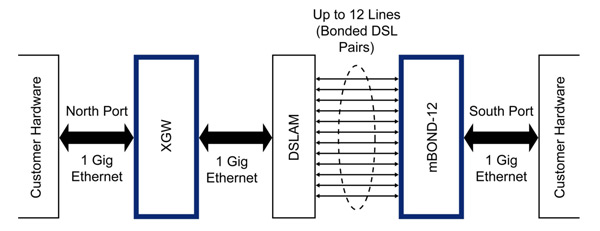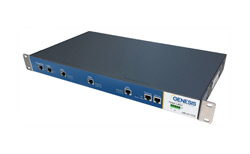Genesis Technical Systems has debuted a plug-and-play bonding solution capable of achieving up to 1Gbps by bonding together pairs of T1 or E1 copper cables, that has been designed as a stop-gap solution for operators seeking a cheaper alternative to fibre and microwave.
mBond has the ability to aggregate the available bandwidth per pair of cables to gain even more bandwidth, for example, if each pair could deliver 10 Mbps, then 12 pairs would enable an operator to provide 120 Mbps in coverage.
The solution works by placing two boxes on either end of a set distance – one box placed at the base station, and one placed at the customer premises equipment (CPE). The boxes have a Gigabit pipe connector on each box and bond the cables together so that the resulting bandwidth across the set distance is much higher.
There are already digital subscriber line access multiplexer (DSLAM) bonding solutions available in the market, but what makes mBond unique is the fact that usually the boxes for both the CPE and the base station have to be bought separately.
Genesis’ solution comes with management platform software installed in the boxes, enabling operators to manage the distances and see where the bandwidth speeds are dropping.
“If nothing else, [mBond] is a stop-gap measure and a quick deployment. The copper’s there, they just have to install the boxes and it’s done,” Genesis Technical Systems CEO and founder Stephen Cooke told Mobile Europe.
“They don’t have dig up the streets and install fibre. Everybody’s got GigE so it’s completely interoperable.”
Genesis has been trialling mBond with several South-East Asian tier-1 operators and successfully achieved 157 Mbps at 1.45 km with 12-pairs and 77 Mbps at 1.3 km with 4-pairs, making it a viable alternative to costly fibre and microwave backhaul deployments.

“Most telcos cannot afford to put fibre in, so because they’ve got this paid-for copper asset, they need to get some more out of it. The capex is significantly smaller. Microwave [deployments], which are less reliable, cost about €45,000-€60,000 per deployment and fibre deployments typically cost €120,000 to do a base station, whereas if you deploy mBond, it will cost you about €12,000,” he said.
The solution can also be used to improve the backhaul provided to small cells sharing with the macrocell as the pool of bandwidth to share is significantly greater, and it is this aspect, according to Cooke, that the Southeast Asian operators are finding most attractive.
“What the operators have said is that they want the mBond for their base transceiver stations (BTS) but they will not rip up the road to put in fibre to deploy small cells, so the bottom line is that they need a copper backhaul technology to implement small cells,” he said.



